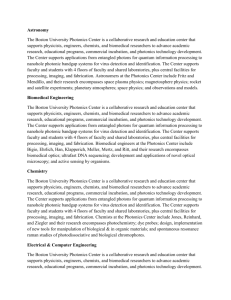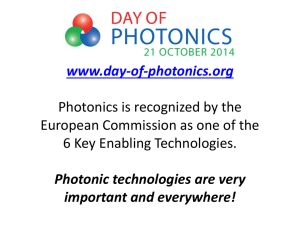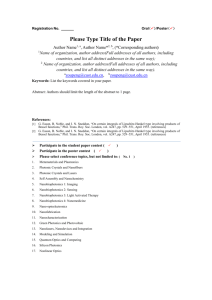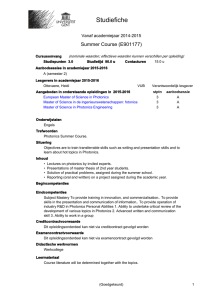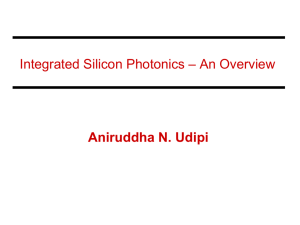Biomedical Engineering
advertisement
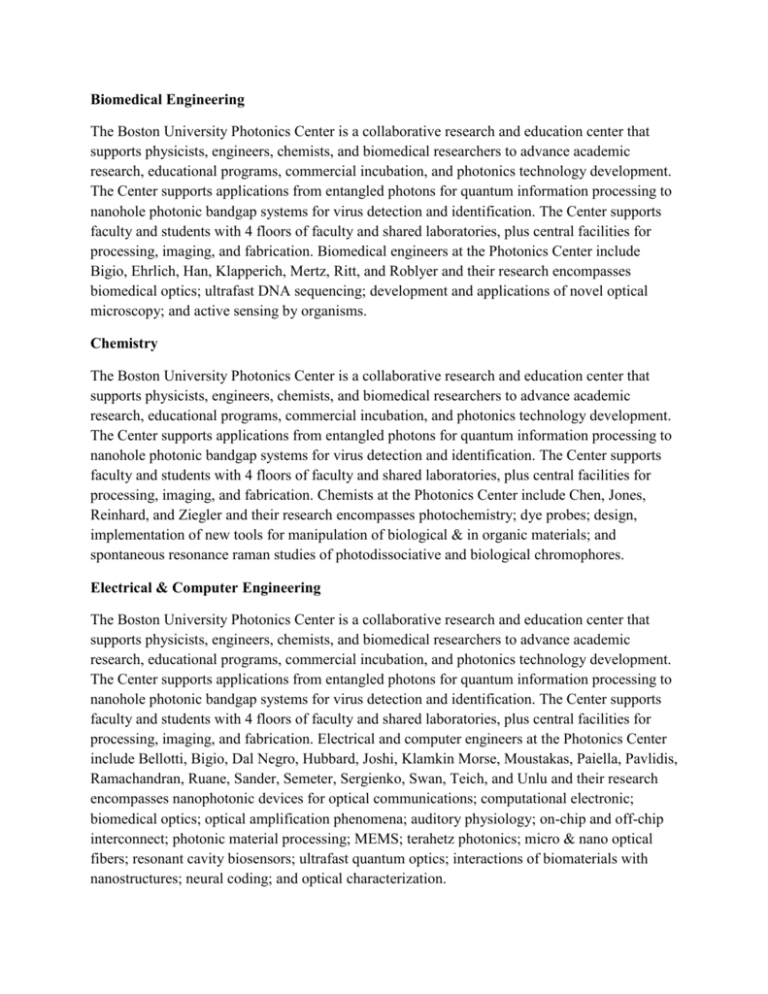
Biomedical Engineering The Boston University Photonics Center is a collaborative research and education center that supports physicists, engineers, chemists, and biomedical researchers to advance academic research, educational programs, commercial incubation, and photonics technology development. The Center supports applications from entangled photons for quantum information processing to nanohole photonic bandgap systems for virus detection and identification. The Center supports faculty and students with 4 floors of faculty and shared laboratories, plus central facilities for processing, imaging, and fabrication. Biomedical engineers at the Photonics Center include Bigio, Ehrlich, Han, Klapperich, Mertz, Ritt, and Roblyer and their research encompasses biomedical optics; ultrafast DNA sequencing; development and applications of novel optical microscopy; and active sensing by organisms. Chemistry The Boston University Photonics Center is a collaborative research and education center that supports physicists, engineers, chemists, and biomedical researchers to advance academic research, educational programs, commercial incubation, and photonics technology development. The Center supports applications from entangled photons for quantum information processing to nanohole photonic bandgap systems for virus detection and identification. The Center supports faculty and students with 4 floors of faculty and shared laboratories, plus central facilities for processing, imaging, and fabrication. Chemists at the Photonics Center include Chen, Jones, Reinhard, and Ziegler and their research encompasses photochemistry; dye probes; design, implementation of new tools for manipulation of biological & in organic materials; and spontaneous resonance raman studies of photodissociative and biological chromophores. Electrical & Computer Engineering The Boston University Photonics Center is a collaborative research and education center that supports physicists, engineers, chemists, and biomedical researchers to advance academic research, educational programs, commercial incubation, and photonics technology development. The Center supports applications from entangled photons for quantum information processing to nanohole photonic bandgap systems for virus detection and identification. The Center supports faculty and students with 4 floors of faculty and shared laboratories, plus central facilities for processing, imaging, and fabrication. Electrical and computer engineers at the Photonics Center include Bellotti, Bigio, Dal Negro, Hubbard, Joshi, Klamkin Morse, Moustakas, Paiella, Pavlidis, Ramachandran, Ruane, Sander, Semeter, Sergienko, Swan, Teich, and Unlu and their research encompasses nanophotonic devices for optical communications; computational electronic; biomedical optics; optical amplification phenomena; auditory physiology; on-chip and off-chip interconnect; photonic material processing; MEMS; terahetz photonics; micro & nano optical fibers; resonant cavity biosensors; ultrafast quantum optics; interactions of biomaterials with nanostructures; neural coding; and optical characterization. Mechanical Engineering The Center supports applications from entangled photons for quantum information processing to nanohole photonic bandgap systems for virus detection and identification. The Center supports faculty and students with 4 floors of faculty and shared laboratories, plus central facilities for processing, imaging, and fabrication. Mechanical engineers at the Photonics Center include Basu, Bifano, Bunch, Ekinci, Fawcett, Schmidt, Sharon, White, and Zhang and their research encompasses microelectromechanical systems (MEMS); ultra-thin metal films; biodetection, optics, nanscale lithography and imaging; electromechanical machines, and nano and microsystems. Medical School The Boston University Photonics Center is a collaborative research and education center that supports physicists, engineers, chemists, and biomedical researchers to advance academic research, educational programs, commercial incubation, and photonics technology development. The Center supports applications from entangled photons for quantum information processing to nanohole photonic bandgap systems for virus detection and identification. The Center supports faculty and students with 4 floors of faculty and shared laboratories, plus central facilities for processing, imaging, and fabrication. Medical school professors include Connor, Gabel and Goldstein, and their research encompasses protein synthesis in virus replication; vesicular stomatitis virus; optical neurophysiology; and femtosecond laser surgery. Metropolitan College The Boston University Photonics Center is a collaborative research and education center that supports physicists, engineers, chemists, and biomedical researchers to advance academic research, educational programs, commercial incubation, and photonics technology development. The Center supports applications from entangled photons for quantum information processing to nanohole photonic bandgap systems for virus detection and identification. The Center supports faculty and students with 4 floors of faculty and shared laboratories, plus central facilities for processing, imaging, and fabrication. Barry Unger is a Metropolitan College professor at the Photonics Center, and his research encompasses venture capital investment; product design process; and MIT Tech. Enterprise Forum. Physics The Boston University Photonics Center is a collaborative research and education center that supports physicists, engineers, chemists, and biomedical researchers to advance academic research, educational programs, commercial incubation, and photonics technology development. The Center supports applications from entangled photons for quantum information processing to nanohole photonic bandgap systems for virus detection and identification. The Center supports faculty and students with 4 floors of faculty and shared laboratories, plus central facilities for processing, imaging, and fabrication. Physicists at the Photonics Center include Goldberg, Rothschild and Erramilli, and their research encompasses solid immersion microscopy for integrated circuits; fundamental physics of graphene; tip-enhanced near-field scanning optical microscopy to explore aperiodic nanostructures for energy focusing and ultra-sensitive detection; tunable metamaterials and THz imaging; infrared microscopy and ultrafast infrared spectroscopy.
